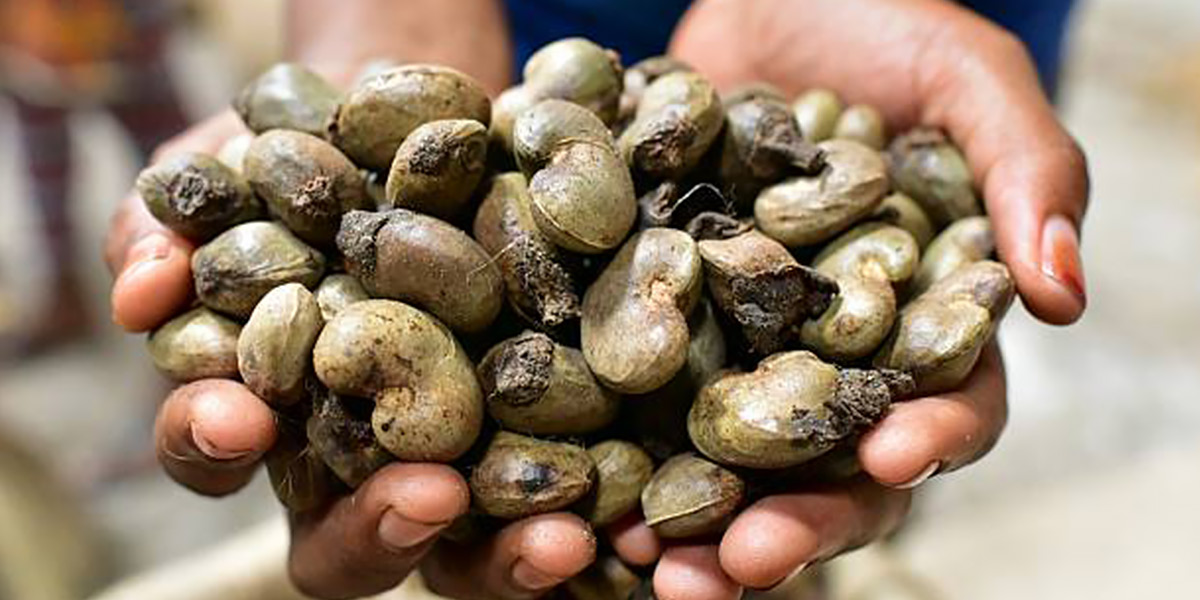Bowl of cashew nuts contain many nutrients and have various positive effects on health - good reasons to having them more often in the diet.
However, very few are likely to know that cashew kernels are extremely healthy. Among other things, they contain the amino acid L-tryptophan, which is known to make people happy. But that's not all. They also boast an incredible nutrient mix of a range of essential vitamins and minerals. This makes them very healthy - if you consider the ideal combination with other foods.
Cashew nuts are not only incredibly delicious - they are also a very healthy snack, because the dried fruit stalks of the cashew apple contain a whole range of vitamins and minerals. FITBOOK has put together what these are, how cashews affect cholesterol and blood pressure, why they can help you lose weight and how they are ideally combined.
The cashew tree (lat. Anacardium occidentale) originally comes from Brazil and is also called cashew or cashew tree. Cultivation areas for the European market are in Central Africa and Asia. The cashew kernel itself (also called cashew nut or just cashew) is the dried stalk of the cashew apple. Strictly speaking, it is a stone fruit, similar to the almond or pistachio. The process of extracting cashew nuts is complex and involves small steps, which is why we only sell cashews that have already been peeled and roasted. Raw produce is highly perishable and roasting requires expertise.
Compared to other nuts, cashew nuts have a low fat content. The contained proportion of healthy, unsaturated fatty acids is nevertheless high. In terms of protein content, cashews are in the midfield of nuts.1
Calories: about 570 per 100 grams
Fat: approx. 42 grams (of which approx. 28 grams monounsaturated, approx. 3 grams polyunsaturated and 9 grams unsaturated fats)
Carbohydrates: about 30 grams
Protein: about 17 grams
Fiber: about 3 grams
With Noom you change your eating habits permanently. This way you have full control over your weight and can keep it down in the long term. Activate your personal program today.
Biologist and nutritionist Dr. Andrea Flemmer ("Mood-Food - Glücksnahrung: How to become happy through eating"): The high-quality proteins contain the amino acid L-tryptophan. "This can be converted in the brain to the happiness hormone serotonin and thus has a mood-enhancing effect," explains the expert. The same process occurs when eating chocolate. In addition, the contained L-tryptophan has a calming effect, which is why it is contained in some antidepressants and tranquilizers. 100 grams of cashews contain around 280 milligrams of L-tryptophan - a quite relevant amount.

Cashews contain an ingenious mix of nutrients from a range of essential vitamins and minerals. For example, 100 grams of nuts cover almost half (45 percent) of the Recommended Daily Allowances (RDA)2 - i.e. the recommended daily dose - of vitamin B1, which our body needs so that the nutrients contained specifically in carbohydrates are metabolized and converted into energy can become. The contained and versatile active vitamin B6 strengthens our nerves and immune system.
In addition to other B vitamins, which are important for the function of the nervous system and the structure of mucous membranes, nails and hair, cashew nuts also contain vitamin E i (an antioxidant that protects against calcification of the veins and arteries) and vitamin K, which is associated with the contained Phosphorus promotes blood clotting and building strong bone structure. The minerals magnesium, zinc, iron and potassium contained in it maintain muscle and nerve function.
Vitamin B1 (45 Prozent der empfohlenen Tagesdosis = Recommended Daily Allowance oder kurz: RDA)
Vitamin B2 (16 Prozent RDA)
Vitamin B5 (20 Prozent RDA)
Vitamin B6 (21 Prozent RDA)
Vitamin E (6,5 Prozent RDA)
Vitamin K (37 Prozent RDA)
Magnesium (70 Prozent RDA)
Phosphor (48 Prozent RDA)
Kupfer (246 Prozent RDA)
Kalium (25 Prozent RDA)
Eisen (43 Prozent RDA)
Zink (54 Prozent RDA)
Vitamins B and iron are often deficient, especially in people who eat a predominantly plant-based diet. According to a study, those who suffer from heart disease can also benefit from the fats contained in nuts.3 The cholesterol level, as well as high blood pressure, can be reduced with regular consumption.
Cashew nuts can even help you lose weight. In 2019, a study by the Harvard School of Public Health Boston showed that a handful of nuts in a balanced diet can reduce obesity and prevent type 2 diabetes.4 This positive effect has been confirmed in several studies. The previously mentioned amino acid L-tryptophan can also support weight loss. Decreased levels of tryptophan have been found in some people with tumor and viral diseases. By adding the amino acid, an improvement in the state of health could be achieved accordingly.
The type of consumption is crucial so that L-tryptophan and all other vitamins and minerals can be absorbed and processed by the body. Of course, cashew nuts can easily be eaten as a snack. So that the body can fall back on all trace elements, it needs a combination of carbohydrates in the meal. "Because the brain's gatekeepers, who allow the tryptophan to be converted, are choosy and need an incentive to absorb the amino acid," says nutrition expert Andrea Flemmer.
It is difficult to make a consumption recommendation because not all seeds contain the same amount of amino acids and the need varies from person to person (varies according to many physical parameters). In other words: "Enjoy with a sense of proportion, but there's no objection to a handful of seeds," says Flemmer.
Caution should be exercised in people who are allergic to tree nuts, such as peanuts and hazelnuts. Do not carry out your own experiments and consult a doctor. An intolerance to cashew nuts themselves is rare. The body's reactions can be stronger than with other nut allergies
For all non-allergic consumers, however, the following applies: Quality makes the difference. Because when the nuts are processed, the natural resin Cashew Nut Shell Liquid (CNSL) is released. It is a protective mechanism of the plant against bacteria and predators. If this is heated too much, it can be poisonous. The load can only be kept low with high-quality further processing.
"It's better to buy the more expensive organic nuts instead of the first package you come across just because they contain the desired product," advises the nutrition expert. “There is no filter in the bloodstream and in front of the brain that removes impurities. Also, if the kernels are treated with a lot of pesticides or are of poor quality, you are poisoning your body from the inside.”
Cashew nuts can be used as a classic ingredient in muesli, salad or as a topping. Cashew butter is available in drugstores and supermarkets and can be easily integrated into many dishes.
1 frozen banana
250ml milk
1 tsp chia seeds
1-2 teaspoons cashew butter
Cinnamon, optional sweetener
Put all ingredients in a blender.
200g leek
800g nutmeg pumpkin
1 small pear (sour)
700ml vegetable broth
Cinnamon, Nutmeg, Allspice, Ginger
1 lemon
3 tbsp cashew butter
Clean the leek, cut into small pieces. Remove the skin and seeds from the pumpkin and cut the flesh into small pieces. Cook the leek and pumpkin with the broth and spices and ginger for ten minutes until soft. Peel the pear, add and simmer for another five minutes. Puree the soup with the cashew butter and lemon zest. Season with salt, pepper and lemon juice. Serve and garnish with mint and roasted cashews. Enjoy your meal!



1. Federal Center for Nutrition. The importance of nuts in the diet (accessed 12/01/2022)
2. National Institutes of Health. Thiamin – Fact Sheet (accessed on December 1st, 2022)
3. Tharrey, M., Mariotti,, F., Mashchak, A. et. al (2018). Patterns of plant and animal protein intake are strongly associated with cardiovascular mortality: the Adventist Health Study-2 cohort. International Journal of Epidemiology.
4. Liu G., Guasch-Ferré, M., Hu, Y. et. al. (2019). Nut Consumption in Relation to Cardiovascular Disease Incidence and Mortality Among Patients With Diabetes Mellitus. Circulation Research.